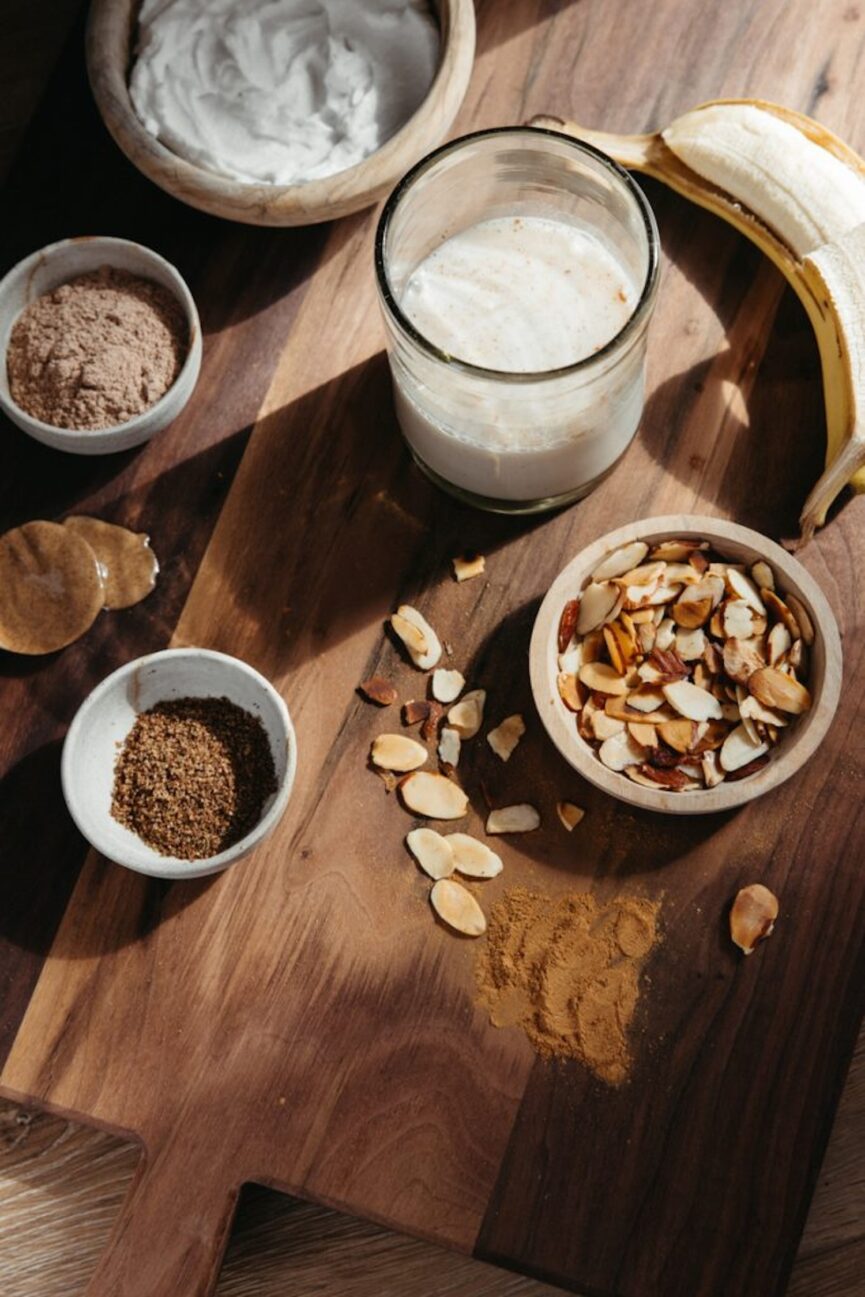The time has come to shift our mindset about carbs. Because contrary to popular belief, they aren’t the villains. Before you protest, hear me out: I’m a Nutrition Consultant who once believed carbs were the culprit. Fast-forward a decade and my PCOS is in remission, I’ve birthed two babies, and my body grows stronger by the day. Without carbs, none of these things would be possible. But with countless diets advocating for a low-carb lifestyle, it’s easy to assume carbs have no place on your plate. Fortunately, this isn’t the case. With your vitality in mind, we’re debunking common carb myths and exploring why they’re essential to a balanced diet.
Spoiler alert: Your energy, brain, and hormones need this macronutrient. Let’s ditch restrictive tendencies and celebrate the goodness of carbs, together.

Why do carbs get a bad rap?
We have diet culture to thank. It has long perpetuated the message that carbs are inherently bad. It paints them as the primary culprits behind weight gain and poor health. This narrative is driven by numerous fad diets and popular misconceptions—which often promote low-carb regimes as the key to slimmer, healthier bodies. As a result, we’ve developed a fear of carbs, avoiding them without understanding their essential role in our well-being. This one-dimensional view neglects two things: the complexity of nutrition and the importance of balanced eating habits.

Carbs: Our Primary Energy Source
Carbs are our primary source of fuel (especially for our brains and muscles). When we eat them, they break down into glucose. And this glucose energizes all of our cells. Therefore, carbs are vital for everything from brushing our teeth and responding to text messages to lacing up our shoes and going for a walk. We need them to survive. Misconceptions aside, the goal is to balance your carb intake with a nutritious diet. In turn, this provides sustained energy levels and promotes metabolic efficiency.
Not All Carbs Are Created Equal
It’s no surprise that carbs receive their fair share of criticism. But this largely stems from the prevalence of ultra-processed carbs in our modern diets. These less nourishing carbs (sugary snacks, refined white bread, etc.), lead to rapid blood sugar spikes. In turn, this increases our overall hunger, causes metabolic problems, and toys with our delicate hormones.
On the other hand, others are incredibly nutritious: fiber-forward veggies, polyphenol-rich fruits, legumes, and sprouted grains. These (unlike their refined carb counterparts) provide vital nutrients.

What are the different types of carbohydrates?
Let’s unpack the basics:
1. Starchy Carbohydrates
Starchy carbs are complex carbs that provide a significant source of energy. They’re made up of long chains of glucose molecules, which take longer to digest and provide a steady release of fuel.
- Examples: Potatoes, rice, pasta, bread, corn, and legumes—like beans and lentils.
- Benefits: These carbs are excellent for sustained energy and are often rich in vitamins and minerals.
While we need starchy carbs, these are the least blood sugar-friendly. Depending on your health goals or conditions, you’ll want to maximize (or minimize) starchy carbs. For example, if you’re an endurance athlete, work a job that requires heavy lifting/a lot of walking, are pregnant, or you’re recovering from an illness, you’ll likely benefit from a higher (starchy) carb diet. If you’re prediabetic, diabetic, or have PCOS, you may need to eat fewer starchy carbs.
2. Non-Starchy Carbohydrates
Non-starchy carbs, on the other hand, include a variety of produce that is both lower in calories and sugar compared to starchy carbs. These carbs are rich in water and micronutrients.
- Examples: Leafy greens, broccoli, cauliflower, peppers, berries, apples, and citrus fruits.
- Benefits: These carbs are high in vitamins, minerals, and antioxidants. They’re ideal for maintaining a healthy weight and supporting overall health.
3. Fiber
Fiber—a bit of an outlier—is another type of carb. The body can’t digest fiber, so it passes through the digestive system (largely intact), keeping hunger and blood sugar in check.
- Types: Soluble fiber (dissolves in water and forms a gel-like substance) and insoluble fiber (does not dissolve in water and adds bulk to stool).
- Examples: Soluble fiber is found in oats, beans, lentils, apples, and citrus fruits. Insoluble fiber is found in whole grains, nuts, seeds, and veggies (like carrots, celery, and tomatoes).
- Benefits: Fiber is essential for digestive health, helps to prevent constipation, lowers cholesterol levels, and aids in weight management by promoting a feeling of fullness.

Healthy Carb Sources: What to Eat
Embracing the right types—and amounts—of carbs ensures our bodies have the fuel needed to thrive. More on how to calculate your carb needs, below! But generally speaking, healthy carbs include fiber-rich produce (colorful fruits and veggies), tubers (potatoes, sweet potatoes, and yams), legumes (beans and lentils), whole grains (quinoa, brown rice, oats, etc. ), and dairy (organic/pasture-raised milk, yogurt, and kefir).

Less Healthy Carb Sources: What to Minimize
For the sake of blood sugar balance, digestion, and hormone health, it’s best to minimize ultra-processed carbs. After all, these are stripped of their nutritional value (and loaded with added sugars). What do these include? Sugary cereals, granola bars, pastries, and sodas. Instead, enjoy these on special occasions or when a relentless craving strikes.
Hot tip: If you pair your favorite refined carb with a source of protein/healthy fat/fiber (i.e., a drizzle of tahini, a handful of walnuts, an egg, Greek yogurt, etc.) you’ll experience less of a blood sugar spike! Bonus points if you eat your carbs toward the end of your meal/snack.

How many carbs do you need?
Determining how many carbohydrates you need is a bit nuanced. You’ll want to take your age, sex, activity level, and overall health goals into account. But to get started, consider these five factors:
1. Daily Recommendations
General guidelines for carbohydrate intake vary based on different health organizations:
- The Dietary Guidelines for Americans recommend that 45-65% of your total daily calories come from carbohydrates.
- The Institute of Medicine suggests a minimum of 130 grams of carbohydrates per day for adults.
2. Activity Level
Your physical activity level significantly influences your carbohydrate needs:
- Sedentary Lifestyle: If you have a low level of physical activity, you might need fewer carbs. Around 3-5 grams of carbs per kilogram of body weight per day might be sufficient.
- Moderate Activity: For moderate exercise (about 1 hour per day), you might need 5-7 grams of carbs per kilogram of body weight per day.
- High Activity: For athletes or highly active individuals, 7-10 grams of carbs per kilogram of body weight per day might be necessary.
3. Health Goals
- Weight Loss: If your goal is to lose weight, you might consider a lower-carb diet. Many low-carb diets suggest consuming 50-150 grams of carbs per day.
- Maintenance: For maintaining weight, the general recommendation of 45-65% of your total daily calories from carbohydrates is a good target.
- Muscle Gain: If you’re looking to gain muscle, you might need more carbs to fuel your workouts and recovery.
4. Medical Conditions
Certain medical conditions require specific carbohydrate adjustments:
- Diabetes: Managing carbohydrate intake is crucial for blood sugar control. Work with a healthcare provider to determine the right amount of carbs!
- Digestive Issues: Some people benefit from adjusting their carb intake based on digestive conditions, like IBS or celiac disease.
5. Personal Tolerance and Preferences
Everyone’s body reacts differently to carbohydrates. Some of us feel better on a higher-carb diet, while others might thrive on a lower-carb intake. It’s important to pay attention to how your body feels and performs with different carbohydrate levels. A continuous glucose monitor can help you determine this!

Carbs and Blood Sugar Balance
Without sounding like a broken record, carbs play a crucial role in blood sugar regulation. And we want to maintain normal blood sugar levels as frequently as possible. This helps with stable energy levels, fewer mood swings, healthier hormones, and reduces the risk of chronic disease (I.e. diabetes). All of that to say, not all carbs have the same effect on blood sugar levels.
Simple Carbs
Simple carbs, found in sugary foods and drinks, are quickly digested and can cause rapid spikes in blood sugar, followed by crashes that leave you feeling tired and hungry.
Complex carbs
Complex carbs are digested more slowly, providing a gradual release of glucose. This helps maintain stable blood sugar levels.

How to Incorporate Healthy Carbs Into Your Meals
Need inspo? Try these ideas for a day of healthy-carb eating.
- Start your day with a breakfast of eggs scrambled with greens, mushrooms, tomatoes, and goat cheese. Nosh on a slice of sourdough with avocado on the side.
- For lunch, enjoy a quinoa salad with a high-quality protein source—like tempeh, smoked salmon, or leftover steak. Drizzle your favorite olive oil on top!
- For dinner, dig into a hearty plate of 100% whole-grain pasta (or a pasta alternative, like Kaizen) paired with sautéed zucchini and diced chicken sausage.
If you build your plate around protein and fiber, your starchier carbs will fall—naturally—into place.
Low-Carb Diets: Are They Sustainable?
Since the 1970s, low-carb diets have touted the potential for weight loss. While reducing your carb intake can lead to initial weight loss, it’s important to consider its long-term effects. Eliminating—or severely restricting—carbs can lead to nutrient deficiencies, decreased energy levels, an uptick in cortisol, and an increased risk of certain health issues (i.e., amenorrhea).
Additionally, low-carb diets are typically difficult to maintain over time. Hello, vicious cycle of weight loss and regain. Instead of cutting out carbs entirely, focus on fiber-rich carbs to support your wellness goals.

The Truth About Carbs and Weight Gain
The idea that carbs are solely responsible for weight gain is a common (and unfortunate) misconception. Weight gain—in general—is the result of an imbalance between calorie intake and expenditure, regardless of the source of those calories. While it’s true that consuming large amounts of refined carbs can contribute to weight gain, this has to do with their high-calorie content and low nutritional value. In contrast, fiber-forward carbs can actually support weight management. They provide essential nutrients while keeping you feeling full and satisfied.

Carbs—They’re Not the Villain
Carbs are an essential part of a healthy diet. By understanding the difference between healthy and not-so-nourishing carbs, you can make informed choices that support your overall well-being. Focus on incorporating fiber-rich produce and whole grains into your meals, always pairing carbs with protein and healthy fats. When in doubt, crowd out ultra-processed carbs by adding more healthy carbs to your plate. There’s no need to eliminate carbs! Rather, choose options that fuel your long-term health goals. And when that pizza craving strikes, we encourage you to say yes.

